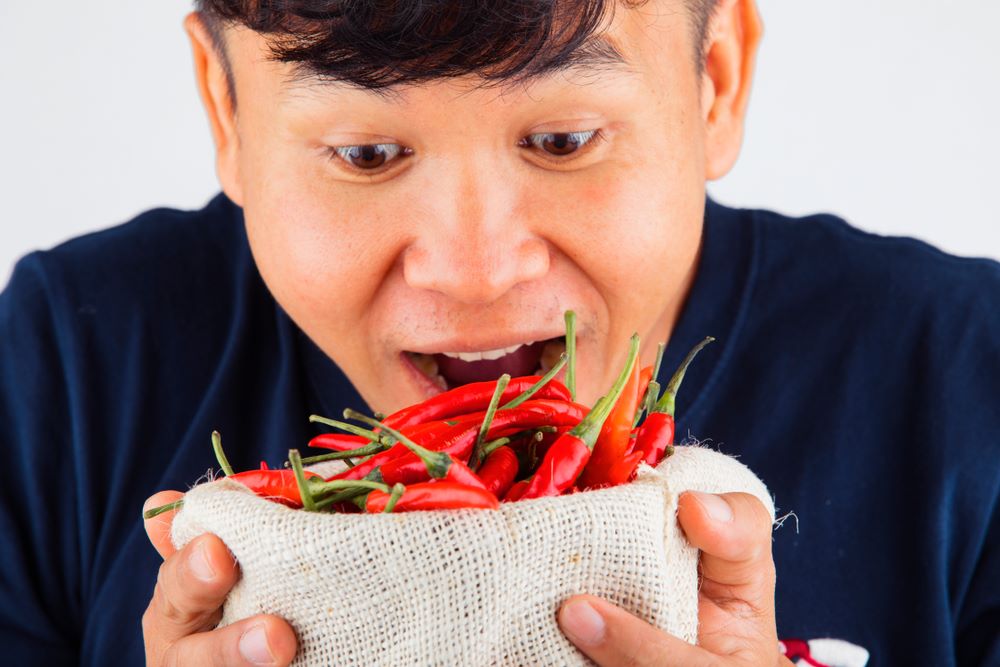Humans can sometimes be questionable living beings. Why do we tend to put ourselves through spicy torture by eating something that often causes pain? Whether spicy or not, chillies have become a staple in our daily cooking. Some people dread it, whereas others love the burn. Most Malaysians do not sway away from spicy food – instead, we are always looking for new foods to test our spiciness limit.
So, what makes chillies spicy? Capsaicin, a chemical found in chillies, is responsible for the burn our mouths feel when we eat spicy food. It triggers various stress hormones that can make us sweat or feel jittery. Before refrigerators, chillies helped keep food fresh as capsaicin slowed or stopped microbial growth. Besides food, capsaicin is also the main ingredient in pepper spray, commonly used for self-defence. It can burn the eyes of attackers – but not kill them. Smaller doses of capsaicin are also used to relieve pain and may aid in weight loss. Interesting.
Here is another mindblower. Our tongue can only taste umami, bitter, sour, sweet, and salty. The spiciness we taste is not a flavour but a pain and heat sensation caused by the body’s pain response system! Capsaicin in chillies activates the TRPV1 protein found in human cells. This protein binds to TRPV1 receptors, senses heat, and alerts the brain of the signal. As a response, the brain sends pain sensations back to the affected areas and tricks the brain into thinking we are getting burned. You may wonder why we feel euphoric eating spicy food when it is inherently unpleasant. Pain produced also causes the brain to release neurotransmitters such as endorphins and dopamine. The former is the body’s natural way of relieving pain by blocking the nerve’s ability to send pain signals; the latter is responsible for a sense of pleasure.
Even with chillies, evolution is involved! To our surprise, birds eat chillies when humans face the mouth-searing sensation of eating them like candy. The spiciness of chillies is a defence mechanism developed to prevent a microbial fungus caused by insects. This fungus destroys the seeds of plants before they are consumed and dispersed by birds. Unlike mammals, birds are insensitive to capsaicin, allowing them to eat chillies and seeds without feeling any burn or pain. So why can chillies keep mammals away but attract birds? Chillies have developed a unique defence mechanism to ensure their survival. Mammals have teeth that can destroy the seeds, whereas birds swallow the chillies. Later, when birds defecate, intact seeds are planted on new land, allowing new chilli plants to grow. Furthermore, chillies can increase their chemical defence levels as they ripen by becoming spicier. If you are a spicy food lover, now you know what kind of chilli to buy the next time you go grocery shopping!
Chillies can make us cry, cause runny noses, and make our mouths feel like they are on fire – yet every day, more than two billion people consume them. In some countries, citizens constantly look for the world’s spiciest chillies. The spiciness is measured using the Scoville scale, which measures capsaicin levels in chillies. Sweet peppers have 0 Scoville units, whereas bird’s-eye chillies, commonly used in Malaysian and Thai cooking, measure from 100,000 to 250,000 Scoville units. This could explain why some Malaysians have such high spicy tolerance. The Carolina Reaper is officially throned as the world’s spiciest chilli by the Guinness Book of World Records, measuring 2.2 million Scoville units. Now that is SPICY!
You probably would have heard our elders say to drink milk when the spiciness becomes too much to handle. But why milk instead of plain water? To our dismay, water does almost nothing to reduce heat, whereas milk can tame the flames in our mouths. Beverages with high-fat content, like milk, ice cream, or yoghurt, contain casein. This molecule can wash away capsaicin and quell the heat. Capsaicin is hydrophobic, meaning it does not dissolve in water but can readily dissolve in oils and fats.
Thanks to evolution, we now have over 3,000 varieties of chilli that differ in spiciness, size, shape, and colour that are available worldwide. Chillies are an essential part of various foods and are used by different cultures around the globe. As the old saying goes, too much of anything is wrong. Eating over-spicy foods can upset our stomachs and cause insomnia. So always eat them in moderation, and never take more than you can handle!





